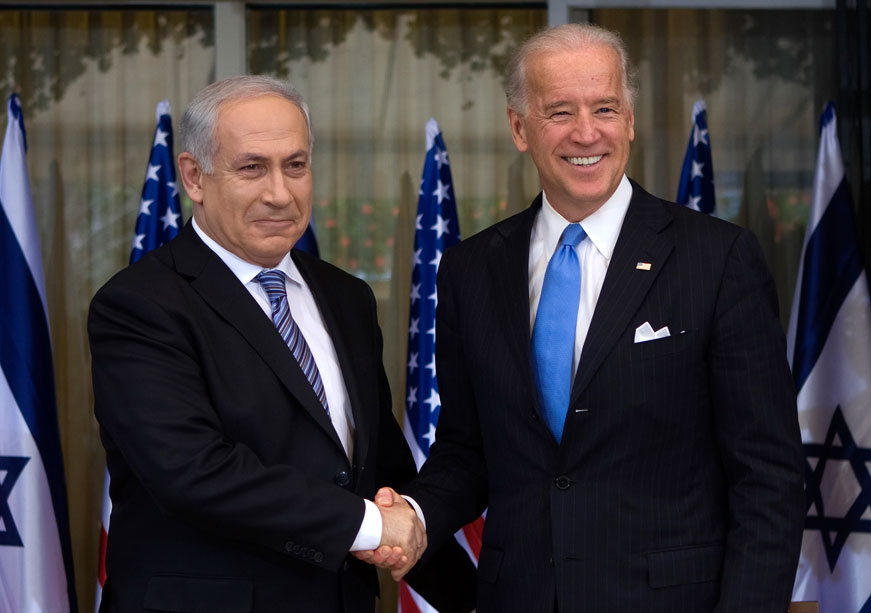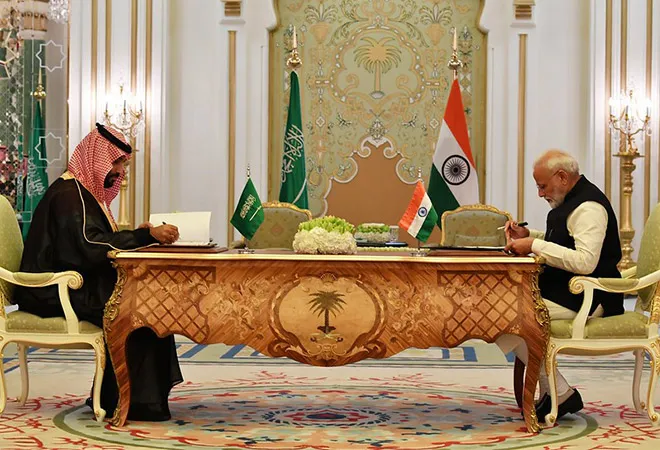Biden’s legacy in the Middle East has been characterised by his unwavering support for Israel, ushering a comparative paradigm tracing back to his predecessors, most significantly Truman, who recognised Israel as an independent state in 1948. The core reasons for historically strong US support for Israel have been the Jewish population’s history of persecution and for America to secure a democratic ally in the Middle East in a strategically volatile Gulf. Another explanation of America’s support for Israel can be traced back to Mearsheimer and Walt’s ‘The Israel Lobby’ (2007). The theory conjectures that Bush’s war on Iraq (2002) was to secure Israel’s, and by extension, America’s position in the Middle East, given Iraq’s history of conflict with Israel and Saudi Arabia. A pro-Israel policy is a legacy that Biden inherited but what he leaves behind for the next administration is critical.
America, since the 1970s, has provided billions to Israel in military aid and will continue to do till 2028, backed by a Congressional Understanding. Since 2021, Biden’s policy focus in the region has been to develop a Middle-East ‘security network’ by way of which Israel has some regional assurances. This network, which primarily involved the UAE, Saudi Arabia, and Jordan, assisted Israel in intercepting the attacks on it by Iran in April this year. Yet, Israeli ground actions in Gaza and now inside Lebanon have become progressively less controllable by Biden. The Israeli decision to conduct a precision strike inside Beirut to kill Hassan Nasrallah was conveyed to U.S. Secretary of Defense Llyod Austin after the Israeli jets had scrambled, irking the Biden administration. A prerequisite for building a security cushion inside the Middle East requires consistency and trust, both of which are absent in the current Israel-US conversations. This may be because there is a fundamental divide in the vision and end goal that both DC and Tel Aviv seek in the region. For Biden, a lame-duck president, peace in the region through a ceasefire may be his last moonshot at a legacy. For Netanyahu, his cabinet’s push to reshape the Middle East by establishing a long-lasting deterrence weighs heavier. Between an escalation of dominance in the region by Israel and the creation of the Palestinian state lies the danger of a regional war which seems the most immediate possibility.
What has added to Biden’s conundrum is the US’ successively depleting control over other Middle-East powers such as Iran. Trump’s withdrawal from the JCPOA (Joint Comprehensive Plan of Action) was a lost opportunity for the Biden administration. Subsequently, the question of what could a nuclear Iran mean for the region has grown starker for US allies in the region—Israel and Saudi Arabia—which seek their own security guarantees from the US. Resultantly, under Biden’s presidency, Iran’s violation of IAEA’s terms notwithstanding, Netanyahu, Tehran, and Riyadh have all wrangled with DC on whether the JCPOA should be revived. Now that Iran has attacked Israel twice within months, that conversation has been further relegated.
While the Biden administration has called Iran “dangerous” and remains a steadfast ally of Israel, the US has depicted a milder regional approach urging Netanyahu to find alternatives to striking Iranian oil fields and advising Israel against attacking Iranian nuclear sites. However, in a vague comment later the same week, on 3 October, Biden indicated that the US and Israel might be in talks regarding attacking Iran’s oil industry. But again, Tel Aviv has demonstrated America’s limited control over it: as America advised Israel to refrain from escalating its attacks on Hezbollah, with Biden calling for a ceasefire. Israel has intensified operations in Beirut and its purported attack on UNIFIL personnel inside Lebanon may have spotlighted Biden in an undesirable way.
The Biden administration is torn between standing with an ally and battling a perception that it is the US which is fuelling the war. An election year in the US has made this gap seem even more yawning. The US-Israel relations may be witnessing its most testing moment. The Israel-Hamas war and ensuing regional tensions have laid bare deep divisions in the American social fabric. While there is a clear assessment of the indispensability of Israel as the US’ most important ally in the Middle East, indeed in the world, the campus protests and rising antisemitism in the US suggest there is a growing gap between the political dispensation and a rapidly changing demography in the US which is symbolic of a generational divide. As protests across America and the world against Israel intensified, the Democratic party sought to recalibrate as it saw at stake the votes of 3.5 million Arab Muslims residing in the States.
In the larger global strategic puzzle, Israel has been an important cog in America’s Middle East wheel, particularly with its strategic dependence on Israel. To be sure, through Israel’s tech advancements, the US wants to influence industrial expansion in the UAE, given the billions worth of technology trade between the US and UAE, with expanding AI developments. More importantly, Israel serves as a counterbalance to Russian-Chinese joint influence in the region with both taking clear positions against Israel since Israel’s response to the 7 October attacks.
For the Biden administration, the growing influence of China in the Middle East has piled on its regional strategic calculations. Not only has China condemned Israel’s actions but its growing footprints in the region through its investments depict a more favourable view of it than of the US. China-led negotiations between Tehran and Riyadh may well have sown the seeds for a future talk between the two sides, should Israel’s actions compel them to. As such, Israel’s actions will become the greatest externality shaping the course of Biden’s negotiations with the ‘Arab Quint’ to shape America’s regional interests. Perhaps the starkest example in this regard is the Saudi-Israel normalisation. As much as Saudi Arabia wants Iran to cut to size and a region without its ‘axis of resistance’, normalisation with Israel without definitive forms in the negotiations for a Palestinian state is hard to imagine.
Meanwhile, domestic political trends in the US chart two different paths for US-Israel relations under a Kamala Harris government or a Donald Trump administration, even if varying slightly. For Israel, particularly the Netanyahu government, a Trump administration would be more favourable. Preliminary signals have already been sent with Harris skipping Netanyahu’s address to a joint session of the US Congress earlier this year and his rather public meeting with Trump on the same trip. That the Democrats rejected an Israel-only Bill, stopping a 17.6-billion dollar funding towards Israel earlier this year has also signalled a prospective policy stance under a likely Harris administration.
Before the recent Israel-Hamas conflict, America’s Middle East policy had focused on peaceful diplomacy and a gradual reduction of influence fronted by its withdrawal from Afghanistan, which allowed China to gain a foothold in the region. Biden wouldn’t want to risk turning the Middle East into a battleground between China and the US. Moreover, the fallout from the 7 October events, including the strain on US-Saudi relations, could give China a greater opportunity to further its influence. However, Biden may be racing against time to leave behind a legacy of supporting Israel for maintaining significant US stakes in the Middle East, in turn allowing it to refocus more attention on the Indo-Pacific.
Despite US Secretary of State Antony Blinken’s 10-time visit and Biden’s “countless talks” with Israel a cease-fire deal remains elusive. Israel has signalled a choice for independent decision-making when required and the US has refused to supply the IDF towards its specific attacks which might harm civilians. As neither Hamas nor Israel refuses to back down, the situation is turning into a classic game theory spectacle.
As Kamala slightly edges Trump out in popular support according to the latest polls and Netanyahu becomes increasingly unpopular among the American populace, will Kamala uphold Biden’s Israel policies? It is clear, as of now, that Kamala views Iran as a destabilising force in the Gulf. She has stated support for Israel but also expressed concern regarding the killing of thousands of Palestinians. She has also assured that the US would continue to pressure Israel for a ceasefire, a stronger stance than Biden. As Arab-Americans hope for Harris’ distance from Netanyahu, currently, there isn’t much difference between Biden’s and Harris’ Middle-East approach, as she could inherit an increasingly volatile Gulf.
Vivek Mishra is the Deputy Director of the Strategic Studies Programme at the Observer Research Foundation
Kashvi Chaudhary is a Research Intern at the Observer Research Foundation












